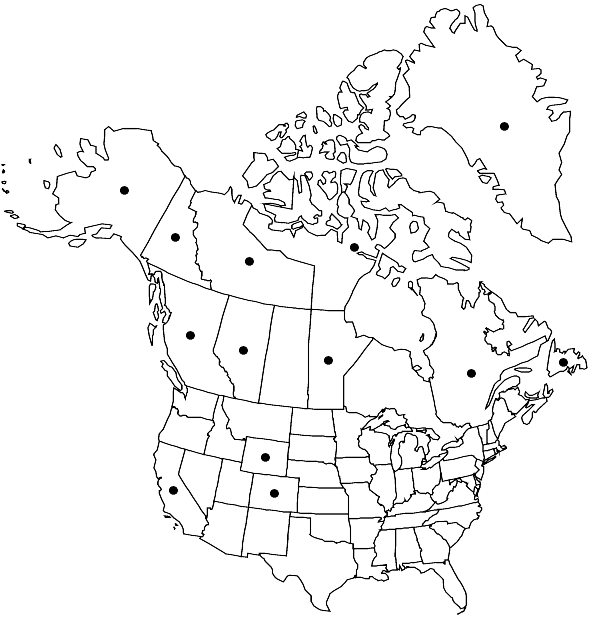Difference between revisions of "Tortula systylia"
Musc. Scand., 20. 1879,.
FNA>Volume Importer |
FNA>Volume Importer |
||
| Line 25: | Line 25: | ||
|elevation=high elevations (to 3700 m) | |elevation=high elevations (to 3700 m) | ||
|distribution=Greenland;Alta.;B.C.;Man.;Nfld. and Labr. (Nfld.);N.W.T.;Nunavut;Que.;Yukon;Alaska;Calif.;Colo.;Wyo.;Europe;Asia. | |distribution=Greenland;Alta.;B.C.;Man.;Nfld. and Labr. (Nfld.);N.W.T.;Nunavut;Que.;Yukon;Alaska;Calif.;Colo.;Wyo.;Europe;Asia. | ||
| − | |discussion=<p>Tortula systylia may be confused with Stegonia but the latter has a distinct triangle of echlorophyllose cells at the apex of the much broader leaves. It is similar also to T. hoppeana, but the laminal cells are smooth. After dehiscence, the systylius capsules retain a raised operculum on the columellar stalk.</p> | + | |discussion=<p><i>Tortula systylia</i> may be confused with <i>Stegonia</i> but the latter has a distinct triangle of echlorophyllose cells at the apex of the much broader leaves. It is similar also to <i>T. hoppeana</i>, but the laminal cells are smooth. After dehiscence, the systylius capsules retain a raised operculum on the columellar stalk.</p> |
|tables= | |tables= | ||
|references= | |references= | ||
| Line 49: | Line 49: | ||
|publication year= | |publication year= | ||
|special status= | |special status= | ||
| − | |source xml=https://jpend@bitbucket.org/aafc-mbb/fna-data-curation.git/src/ | + | |source xml=https://jpend@bitbucket.org/aafc-mbb/fna-data-curation.git/src/8f726806613d60c220dc4493de13607dd3150896/coarse_grained_fna_xml/V27/V27_860.xml |
|subfamily=Pottiaceae subfam. Pottioideae | |subfamily=Pottiaceae subfam. Pottioideae | ||
|genus=Tortula | |genus=Tortula | ||
Revision as of 17:58, 18 September 2019
Leaves obovate to occasionally ovate, apex acute or broadly acute, awned, margins recurved or plane proximally, not bordered; costa excurrent into the awn, lacking an adaxial pad of cells, distally narrow, 2–3 cells across the convex adaxial surface; distal laminal cells hexagonal to rhomboidal, width 15–22 µm wide, 1:1 near apex but elongate at mid leaf and basally, smooth. Sexual condition autoicous. Sporophytes exerted. Seta 0.8–1.1 cm. Capsule systylius, short-cylindric, erect and nearly straight, urn 1.5–2 mm; peristome 200–250 µm, teeth 16, straight, divided to near base but variously fused or perforate, basal membrane low; operculum 0.5–0.7 mm. Spores 22–30(–35) µm, spheric, warty papillose.
Phenology: Capsules mature summer.
Habitat: Soil in rock crevices, tundra
Elevation: high elevations (to 3700 m)
Distribution

Greenland, Alta., B.C., Man., Nfld. and Labr. (Nfld.), N.W.T., Nunavut, Que., Yukon, Alaska, Calif., Colo., Wyo., Europe, Asia.
Discussion
Tortula systylia may be confused with Stegonia but the latter has a distinct triangle of echlorophyllose cells at the apex of the much broader leaves. It is similar also to T. hoppeana, but the laminal cells are smooth. After dehiscence, the systylius capsules retain a raised operculum on the columellar stalk.
Selected References
None.